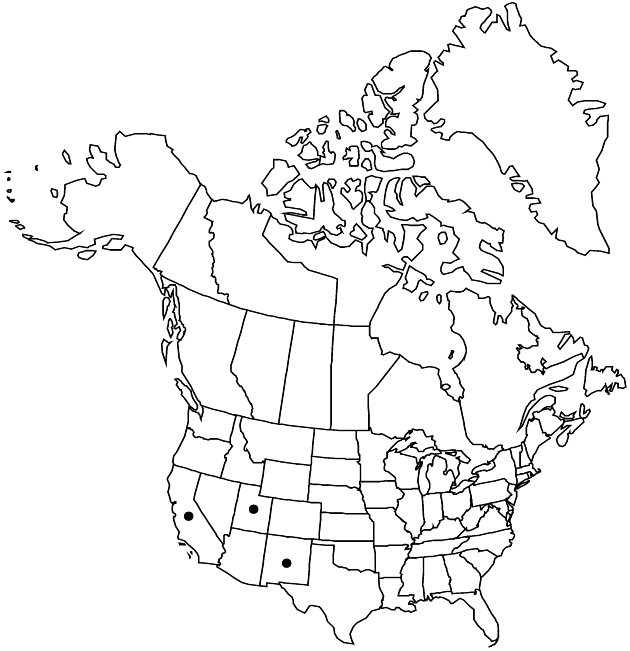Difference between revisions of "Heliomeris hispida"
Torreya 18: 183. 1918.
FNA>Volume Importer |
FNA>Volume Importer |
||
| Line 15: | Line 15: | ||
|name=Heliomeris hispida var. ciliata | |name=Heliomeris hispida var. ciliata | ||
|authority=(B. L. Robinson & Greenman) Cockerell | |authority=(B. L. Robinson & Greenman) Cockerell | ||
| − | }}{{Treatment/ID/Synonym | + | }} {{Treatment/ID/Synonym |
|name=Viguiera ciliata | |name=Viguiera ciliata | ||
|authority=unknown | |authority=unknown | ||
| − | }}{{Treatment/ID/Synonym | + | }} {{Treatment/ID/Synonym |
|name=Viguiera ciliata var. hispida | |name=Viguiera ciliata var. hispida | ||
|authority=(A. Gray) S. F. Blake | |authority=(A. Gray) S. F. Blake | ||
| Line 36: | Line 36: | ||
|elevation=1200–2200 m | |elevation=1200–2200 m | ||
|distribution=Calif.;N.Mex.;Utah;Mexico (Chihuahua;Sonora). | |distribution=Calif.;N.Mex.;Utah;Mexico (Chihuahua;Sonora). | ||
| − | |discussion=<p>Variety ciliata has been separated based on having less dense pubescence; W. F. Yates and C. B. Heiser (1979) felt that this is insufficient for taxonomic recognition, noting that the type collection of H. hispida includes both indument forms. Heliomeris hispida appears to be relatively rare.</p> | + | |discussion=<p>Variety ciliata has been separated based on having less dense pubescence; W. F. Yates and C. B. Heiser (1979) felt that this is insufficient for taxonomic recognition, noting that the type collection of <i>H. hispida</i> includes both indument forms. <i>Heliomeris hispida</i> appears to be relatively rare.</p> |
|tables= | |tables= | ||
|references= | |references= | ||
| Line 60: | Line 60: | ||
|publication year=1918 | |publication year=1918 | ||
|special status= | |special status= | ||
| − | |source xml=https://jpend@bitbucket.org/aafc-mbb/fna-data-curation.git/src/ | + | |source xml=https://jpend@bitbucket.org/aafc-mbb/fna-data-curation.git/src/8f726806613d60c220dc4493de13607dd3150896/coarse_grained_fna_xml/V19-20-21/V21_414.xml |
|tribe=Asteraceae tribe Heliantheae | |tribe=Asteraceae tribe Heliantheae | ||
|subtribe=Asteraceae (tribe Heliantheae) subtribe Helianthinae | |subtribe=Asteraceae (tribe Heliantheae) subtribe Helianthinae | ||
Revision as of 15:34, 18 September 2019
Annuals, 10–90 cm (taprooted). Stems hispid. Leaves mostly alternate; blades lance-linear to linear, 20–100 × 1–3 mm, margins conspicuously ciliate at least 3/4 their lengths, hairs often than 0.5+ mm, faces hispid, abaxial sometimes gland-dotted. Heads (1–)3–15+. Peduncles 0.5–9 cm, lengths 1/10–1/3 leafy portions of stems. Involucres 9–14 mm diam. Paleae ovate to rectangular, 4.5–5.5 mm, prominently cuspidate. Phyllaries 5.5–10 mm. Ray florets 9–15; laminae oval to obovate, 6–13 mm. Disc florets 50+; corollas 2–3 mm. Cypselae black, 1.5–2.5 mm. 2n = 16.
Phenology: Flowering Jul–Oct.
Habitat: Saline marshes and meadows
Elevation: 1200–2200 m
Distribution

Calif., N.Mex., Utah, Mexico (Chihuahua, Sonora).
Discussion
Variety ciliata has been separated based on having less dense pubescence; W. F. Yates and C. B. Heiser (1979) felt that this is insufficient for taxonomic recognition, noting that the type collection of H. hispida includes both indument forms. Heliomeris hispida appears to be relatively rare.
Selected References
None.